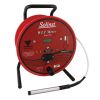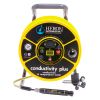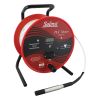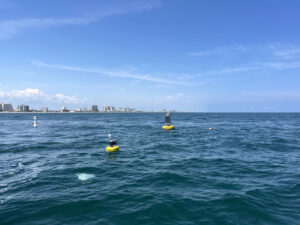Heron dipper-Temp Temperature Meters
Features
- IP65 electronic module displays temperature in degrees Celsius
- IP68 probe is fully depth rated and field-replaceable
- Includes padded carry case with tape guide and hanger
- Free ground shipping
- Expedited repair and warranty service
- Lifetime technical support
- More
Overview
The Heron dipper-Temp temperature meter is ideal for profiling temperature and static water levels in wells, boreholes, standpipes, lakes and rivers. Temperature can alter the physical and chemical properties of water and should be accounted for when determining an increased level of biological activity and water chemistry. Groundwater temperature surveys have also taken on a new significance as geothermal energy becomes more important for domestic heating and cooling. The premium padded carry case comes included to protect your precision instrument from the elements.
Durable
The heat-resistant Kynar jacketed measuring tape on the dipper-Temp-110 allows for temperature profiling up to 110˚C and is able to withstand hydrocarbons, solvents and other harsh contaminants. The markings are under the jacketing for long-term readability.
- Premium Stainless Steel Kynar Coated Tape
- 5/8” (16mm) Temperature Probe (IP68) w/ holder
- Electronic Panel with audio and visual signals (Fully Encapsulated to IP65)
- High Contrast LCD Display
- Vinyl, ergonomic holding grip
- 9V Battery (w/ battery test button)
- Audio On/Off Control
- Backpack Carrying Case w/ adjustable straps, laptop & notepad pouches
In The News
Supplying Seattle’s Drinking Water: Using Data Buoys to Monitor the Cedar River Municipal Watershed
Providing clean, safe, and reliable drinking water for the 1.6 million people in the greater Seattle area is a top priority for Seattle Public Utilities (SPU). With limited water supplies, SPU dedicates considerable resources to maintain its watersheds and mountain reservoirs. About 70 percent of Seattle Water comes from the Cedar River Municipal Watershed , and the other 30 percent comes from the South Fork Tolt River Watershed . [caption id="attachment_39574" align="alignnone" width="940"] Data buoy in Chester Morse Lake . (Credit: Kevin Johnson / Seattle Public Utilities) [/caption] Jamie Thompson, a fisheries biologist at SPU, monitors aquatic ecosystems centered on fish listed under the U.S. Endangered Species Act (ESA).
Read MoreData-Driven Advocacy on the Lower Deschutes River
Like many freshwater environments, the Deschutes River in Oregon is under pressure from development, pollution, and climate change. Many rivers, streams and lakes in the Deschutes Basin do not meet Oregon water quality standards –where state water quality monitoring assesses levels of bacteria, pH, dissolved oxygen, temperature, and fine sediment. Hannah Camel is the Water Quality Coordinator for the Deschutes River Alliance (DRA), a non-profit organization that focuses on the health of the lower 100 miles of the Deschutes River–the area most affected by human intervention. As a data-driven organization, the DRA has benefited from the installation of two NexSens X2 data loggers.
Read MoreExpanding the Port Everglades: Real-Time Monitoring of Water Quality Conditions from Planned Dredging Operation
The Port Everglades in Broward County, Florida, serves large trade vessels and cruiseliners and incoming and outgoing recreational boaters. However, as cargo ships become larger, the port must expand. A dredging project led by the US Army Corps of Engineers will substantially deepen and widen the port's navigation channel to accommodate larger Panamax cargo ships and modern cruise liners. As a result of this project, a large amount of sediment will be displaced into the water column. This suspended sediment may settle outside of the project area, burying benthic organisms like corals, and possibly carrying harmful particulates to other regions. [caption id="attachment_39497" align="aligncenter" width="2560"] A CB-950 and CB-25 deployed on site at Port Everglades.
Read More





















